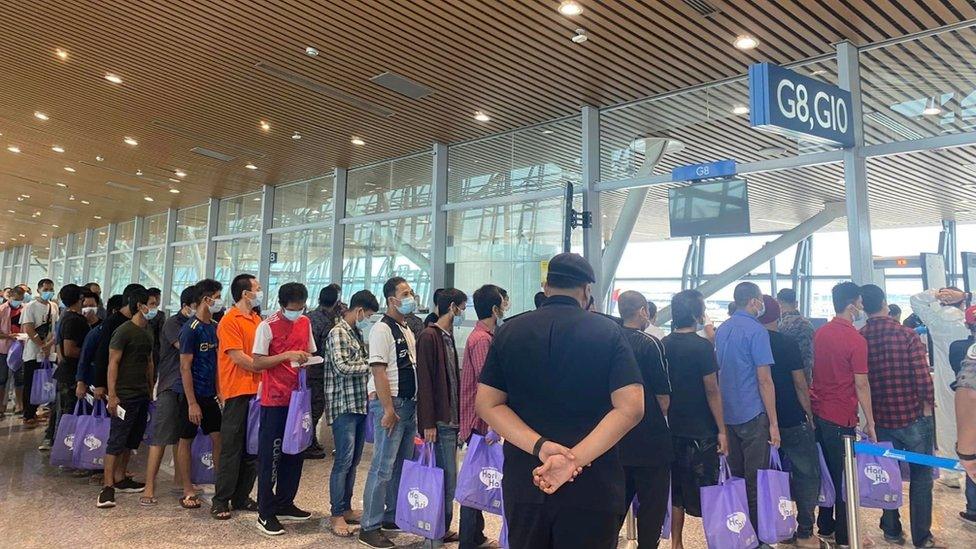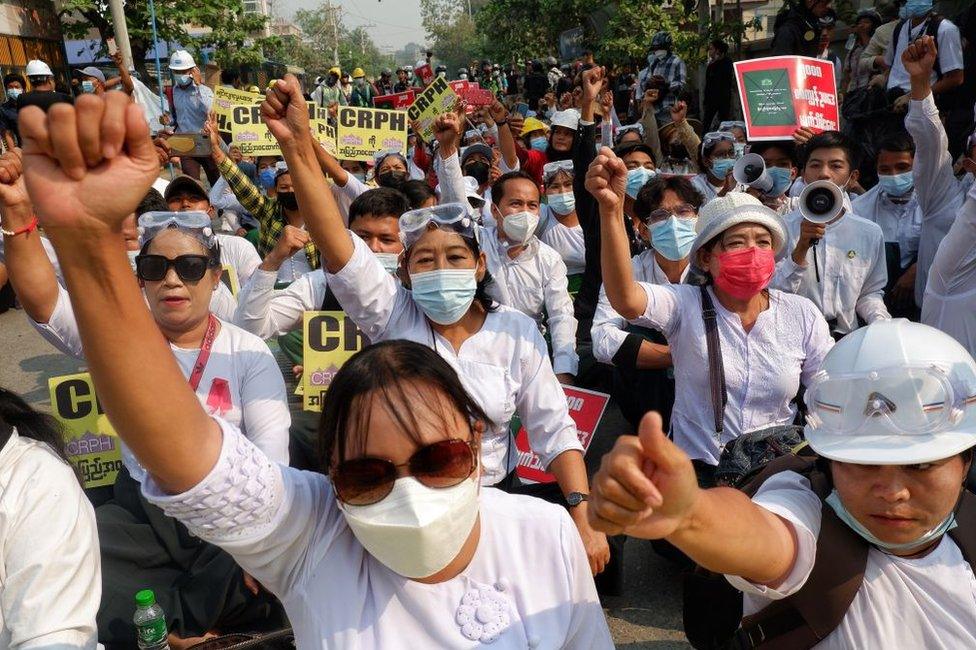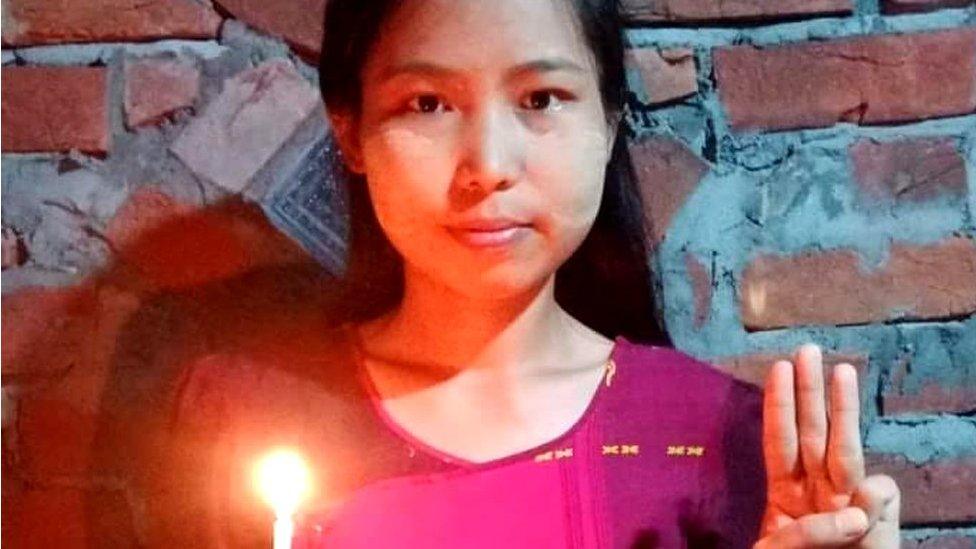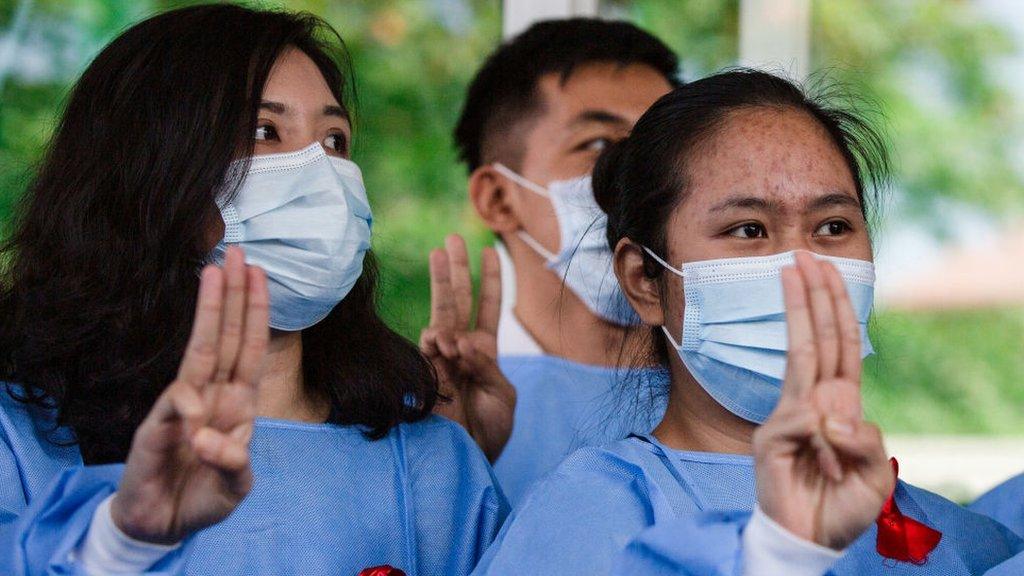Why is Malaysia deporting Myanmar asylum seekers?
- Published

Several flights have been carrying Burmese deportees back home from Kuala Lumpur
On 6 October a flight departed from Malaysia taking 150 Burmese asylum seekers back to Myanmar.
Among them was Kyaw Hla, a young ethnic Rakhine officer from the Myanmar Navy, who defected last year and fled to Malaysia. He was one of six navy defectors on that flight.
Now he is back in Myanmar, in jail. What happened to the others is still unclear.
Malaysian authorities have said little about this and several other flights taking Burmese deportees back to Myanmar. However, the Myanmar embassy in Kuala Lumpur has been posting regularly on its Facebook page about its efforts to get undocumented Burmese nationals sent back - photographs of apparently happy passengers on the flight, and also photos of embassy personnel posing with Malaysian immigration officials.
Officially, Malaysia does not welcome refugees. It is not a signatory to the UN Convention and Protocol on Refugees. It also does not recognise the refugee status given to asylum seekers assessed by the UN Refugee Agency as being at risk if returned to their own country.
Yet Malaysia is home to 185,000 registered refugees and asylum seekers, and many more who are not registered - most of them from Myanmar. It hosts 100,000 Muslim Rohingyas, who fled repression in Myanmar and overcrowded camps in Bangladesh.
"Malaysia has become the preferred destination for a number of threatened minority groups from Myanmar, including the Rohingya, the Chin, and the Kachin," says Phil Robertson from Human Rights Watch. "Those communities and their networks in Malaysia help to protect new arrivals, and support efforts to get refugee status and protection from UNHCR."
Kyaw Hla's cousin, Saw Shwe Mya, who has been living in Malaysia for several years, says he arrived last year. He fled Myanmar after the coup which deposed the government led by Aung San Suu Kyi, and set off a conflict which has consumed much of the country. His wife joined him more recently. Both are from Kyauktaw, a town in Rakhine which has seen some of the fiercest fighting between the army and ethnic Rakhine insurgents of the Arakan Army, and where his mother still lives with his two young sons.
Saw Shwe Mya says she did not ask him whether he was involved in the civil disobedience movement that spread across Myanmar to resist the coup in the weeks after the army seized power. She does not know whether he was driven to defect by opposition to the coup, or by the escalating conflict in Rakhine State.
But she says he tried to keep a low profile, staying near Kuala Lumpur so that he could register as an asylum seeker with the UNHCR. He did whatever jobs he could find to cover his living costs. She says he registered with the UN, and was expecting to receive his "Under Consideration" card, which asylum seekers get while their applications are considered by the UNHCR.
As a defector from the Myanmar military, which has jailed thousands of opponents of its coup, Kyaw Hla would have been a strong contender for refugee status.
He received a call on 21 September telling him to come out and collect his UN card, Saw Shwe Mya says. It was a trick: he and his wife were arrested and detained, pending deportation. On arrival in Yangon on 6 October, they were both arrested, and are now being detained separately in different parts of the city.

Thousands fled Myanmar after a military coup and huge protests against it
In the past Malaysia largely left refugees and asylum seekers alone.
But in the past six months, the country has deported around 2,000 Burmese asylum seekers, according to Human Rights Watch, without any assessment of what risks they might face on their return to Myanmar.
This hardline attitude is in contrast to the stand the Malaysian government has taken against the military regime in Myanmar, and its willingness to reach out to the opposition and the National Unity Government, which remains loyal to deposed leader Aung San Suu Kyi.
The Malaysian Foreign Minister, Saifuddin Abdullah, a former human rights activist, is viewed by the Myanmar opposition as one of its best friends in Asean - the Association of Southeast Asian Nations.
"It's a Jekyll and Hyde policy," Mr Robertson says. "The Ministry of Foreign Affairs is working hard to demand the junta respect human rights and end the violence, while the Ministry of Home Affairs and the Immigration Department are doing deals with the Myanmar embassy to send refugees back."
He says Malaysia's relaxed attitude towards refugees changed at the height of the Covid pandemic, when the public feared that the large migrant communities would spread the disease. This has made mass deportations a popular move in the weeks leading up to the general election scheduled for mid-November.
The BBC contacted Home Affairs Minister Hamzah Zainuddin for a statement about the deportations, but is yet to receive one.
Meanwhile, Kyaw Hla awaits his fate in a cell in central Yangon. He will most likely be tried in secret in a military court, for which there is no appeal, and for defecting he could be sentenced to death.
Related topics
- Published15 July 2022

- Published7 January 2022
